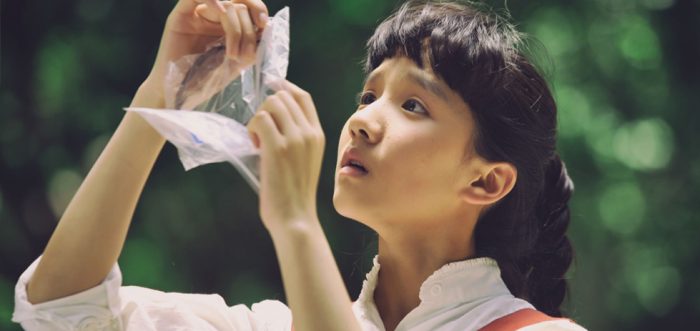
In its opening scenes What’s in the Darkness appears to share a lot in common with the crime procedural genre that director Wang Yichun initially frames the narrative around. Not long into the work, however, is a substantive break away from this trajectory. In turn, this results in a film that plays out as something more more nuanced; a stinging indictment of the patriarchal grasp on institutions, a complex look at the nature of family, and an intimate coming-of-age story – all densely packed into a dialogue between starkly different generations in China.
Our introduction to Detective Qu occurs through a mock-procedural at the town markets, as he jokingly asks a butcher how a pig he’s selling died. Minutes later, the film paces quickly towards the crime-genre as a body is found in a river. The following scenes show Wang taking a different angle as the detectives in her film discuss the issue-at-hand – and in this, the pace comes to a contemplative halt. She directs focus towards the failings of the department, rather than feigning an empathy in an attempt to fulfill the expectations that come with such a film, consciously leading the film towards being more of a critique. Wang contrasts the male-centric police department – failing to catch the right suspect, using intimidation bordering on torture, lazing about, and watching pornography rather than solving the crime – with the adolescence of Detective Qu’s daughter; who spends the first half of the film questioning the institutions around her, constantly trying to break social barriers, and pushing herself into social taboos.
There’s a complex dialogue between generations in the film that takes place, occurring on a variety of levels. When Jing’s father tells her “your generation has it so easy”, reflects on when the “one child policy had just been implemented” and he could “smoke as much as [he] liked”; when her mother castigates her carefreeness and criticises her for being “nothing like your elder brother”, Wang is inserting a conversation about a change of values and experience that feels remarkably candid and intimate. For a debut work, What’s in the Darkness feels remarkably dense, with the authenticity of the story reflecting the personal experiences of Wang Yichun’s own background within a similar situation, growing up in Hebei. The script for the film was written by Wang in her early 20s, self-funded, and has now been released after over a decade since its conception. With this context, there’s a palpable legitimacy to the many criticisms of institutions and social conventions layered in Wang’s film.
The sense of coherency carries through into the visual elements of the film. Zhao Long’s cinematography comes off as both stylised and skilful; littered with washed out and saturated landscape shots, clear camerawork that complements the strength of the acting with a sense of clarity. While What’s in the Darkness is a work that finds its strongest moments in the nuance of its plot alongside the captivating performances and characterisation, the cinematography ties it all together; resulting in a more holistic and polished work.
More subtle interactions that push back against gendered dynamics in the country are frequent, and extend beyond Jing as the central character. In one scene, Zhang, whom Jing grows to admire throughout the film is at the centre of a fight between two male classmates. When later in the day, one of them reflects to Zhang “no one threatens my girl” and tries to put his arm around her, she responds “where are you putting your arm? – who says I’m your girl?”. The presence of these subplots broaden What’s in the Darkness as a work as it becomes clearer throughout that the convincing performances within extend beyond the central characters in the film – resulting in a stunningly coherent, consistent and captivating work. Wang’s attention to detail sees her film emerge as a remarkably clean and strong debut; one that sheds the majority of flaws and irregularities that often bring down such aforementioned films.
Around the Staff
| Megan Nash | |
| Virat Nehru |
